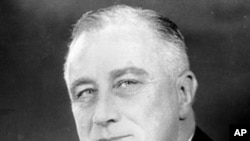Seventy years ago, President Franklin D. Roosevelt delivered a State of the Union address in which he outlined four fundamental freedoms -- freedom of speech and expression, freedom of worship, freedom from fear, and freedom from want. President Roosevelt concluded his speech with words that still guide the United States today: "Freedom means the supremacy of human rights everywhere."
In a recent speech commemorating the Four Freedoms address, U.S. Assistant Secretary for Democracy, Human Rights and Labor Michael Posner talked about the Obama Administration's integrated approach to human rights, and used U.S. policy toward Egypt as an example of how the four freedoms continue to resonate today.
Mr. Posner underscored the particular importance of Roosevelt's freedom from want and explained the important links between civil and political rights on the one hand, and economic, social and cultural rights on the other.
Going forward, the United States aims to help the Egyptian people achieve stability as they build a political system that will honor the aspirations of all citizens – women and men, Muslims and Copts, bloggers and businessmen. Egyptians need to be free from the fear that the State Security police will knock arbitrarily on their door in the night or hack their Facebook pages. And they also need decent jobs and wages.
In the speech, which was given shortly after his recent trip to Egypt, Mr. Posner said Egyptian activists and government leaders view political and social rights, transparency and accountability, economic and social progress as inextricably linked. Mr. Posner said Egypt's Prime Minister Essam Sharaf described his goals as promoting "freedom, democracy, and social justice." Young activists said they were motivated by both the denial of basic political freedoms and the absence of jobs and economic opportunity. Coptic Christian leaders told Assistant Secretary Posner that educational reforms were desperately needed to combat religious bigotry and sectarian violence.
Secretary of State Hillary Clinton makes a point of defending religious freedom throughout the world. In Egypt she stressed that democratic transitions will only succeed when Muslims, Copts, and Jews all have the opportunity to worship freely and in peace.
As President Barack Obama said, Democracy "stands in opposition to aggression and injustice, and our support for universal rights is both fundamental to American leadership and a source of strength in the world."
Four Fundamental Freedoms

"Freedom means the supremacy of human rights everywhere."



